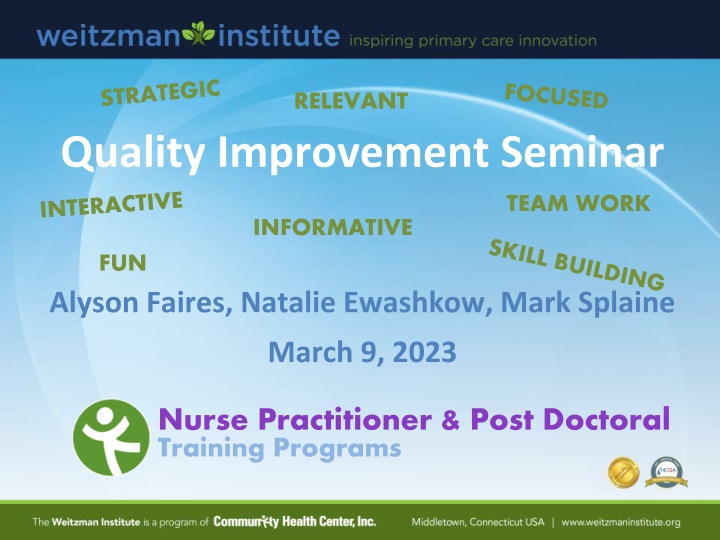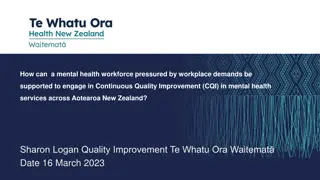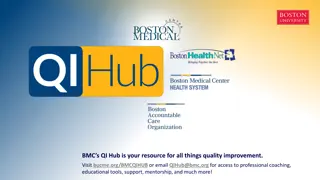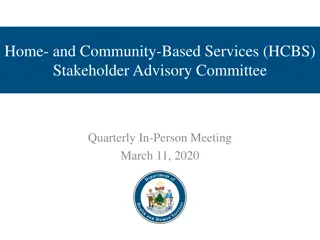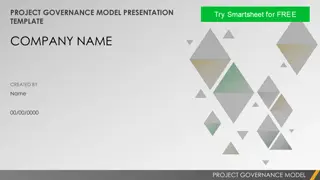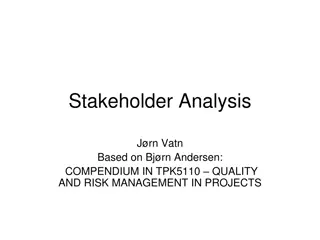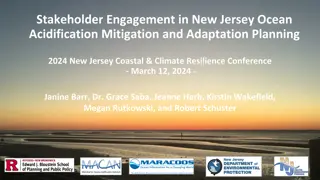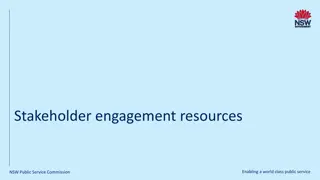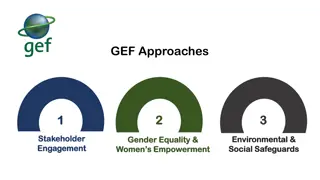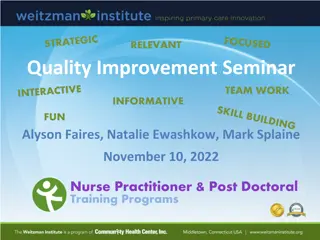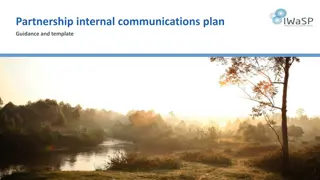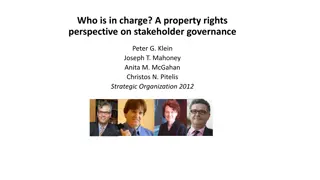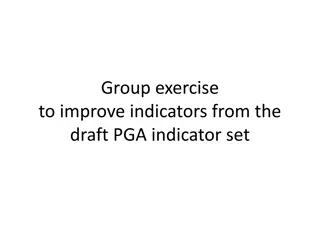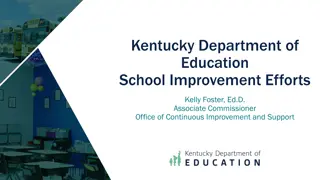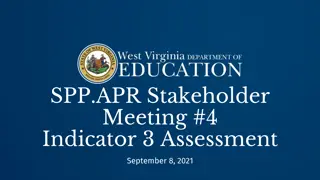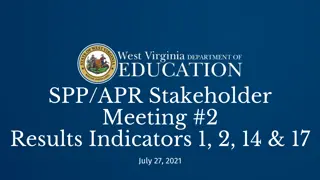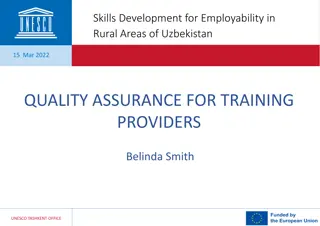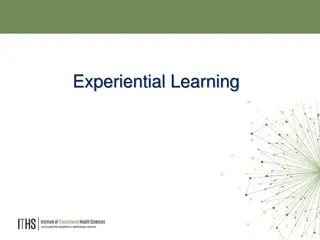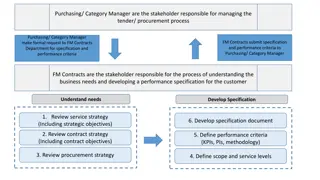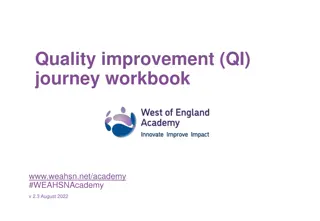Quality Improvement Strategies for Stakeholder Engagement
Dive into the world of quality improvement with a focus on stakeholder engagement at the upcoming seminar led by Alyson Faires, Natalie Ewashkow, and Mark Splaine. Learn about effective conflict management, stakeholder considerations, and more through interactive sessions and insightful discussions. Explore a comprehensive curriculum plan that covers crucial aspects of quality improvement. Get ready to enhance your teamwork skills and delve into informative and fun sessions designed to boost your knowledge and practical skills in healthcare settings.
Download Presentation

Please find below an Image/Link to download the presentation.
The content on the website is provided AS IS for your information and personal use only. It may not be sold, licensed, or shared on other websites without obtaining consent from the author.If you encounter any issues during the download, it is possible that the publisher has removed the file from their server.
You are allowed to download the files provided on this website for personal or commercial use, subject to the condition that they are used lawfully. All files are the property of their respective owners.
The content on the website is provided AS IS for your information and personal use only. It may not be sold, licensed, or shared on other websites without obtaining consent from the author.
E N D
Presentation Transcript
RELEVANT Quality Improvement Seminar TEAM WORK INFORMATIVE FUN Alyson Faires, Natalie Ewashkow, Mark Splaine March 9, 2023 Nurse Practitioner & Post Doctoral Training Programs
Session Goals Learn about input from stakeholders related to a planned change Discuss strategies for further engaging stakeholders Develop approaches for managing conflict Practice using a conflict management approach 2
Agenda Welcome (5 minutes) Stakeholder interview discussion (25 minutes) Conflict management style (5 minutes) Break (5 minutes) Conflict management style discussion (20 minutes) Theory burst - Managing Conflict (20 minutes) Summary and take-home points (10 mins) 3
Roles Theory burst presenter Natalie Technical genius Tempestt Timekeeper & Facilitator Mark Take-home thoughts report-out Nicole 4
Curriculum Plan An overview of Quality Improvement (10/13/22) Care Observations & Stakeholder Considerations (10/27/22) Organizing your Improvement Project (11/10/22) Global Aim and Fishbone Diagram (12/8/22) Process Mapping (Flowcharts) (12/22/22) Measurement to Inform Change (1/12/23 & 1/26/23) An Approach to Testing a Change (2/9/23) Communication about your Improvement Effort (2/23/23) Stakeholder Analysis & Conflict Management (3/9/23) Managing Up and Gaining Leadership Buy-In (3/23/23) Negotiation (4/13/23) Negotiation and More About Cycles of Change (4/27/23) Sustaining your Improvement Effort (5/11/23) Resident Presentations (5/25/23, 6/8/23, 6/22/23)
Stakeholder Interview Discussion We will hear from three teams Sarah, Nicole, Tiara (HealthLinc) B C In your presentation tell us about The change you are planning Who you interviewed What you learned from the discussion 6
Additional Stakeholder Considerations
Influencing Strategy Areas to consider when approaching those not bought in: High emotion Longevity in current process Creation of current process Lack of data Rumor mill Short term concerns Influencing strategy Action By who By when Stakeholder Desired behaviors Short term wins Providers IT HR Nursing PSA Other stakeholders Strategy for building enough support to achieve successful, lasting change
Build Relationships to understand perspective, create champions and to collect meaningful reactions Provide Facts and data Transparency Safe & structured space to interact Active listening Acknowledgement of fears An outline of what will change & what will not Receive Engagement in the change process Input & reaction Together Establishment of TRUST
Poll Question #1 How do you perceive conflict? Threatening An Opportunity Scary Invigorating 11
Exercise Go on mute and use the following link to complete the What Conflict Animal Are You? quiz: https://www.tryinteract.com/quiz/what-conflict- animal-are-you/ The quiz takes about 2 minutes to complete. Type I am ready. in the Zoom chat when you have your result. 12
Break! Take five minutes to recharge and refresh. 13
Small Group Discussion We will break into project groups to discuss your quiz results for 10 minutes In your breakout groups: First, allow each person to share their result Next, consider the following questions Could you predict the result for others in your group? Do the results help explain how you have approached your project work thus far? 14
Debrief What did you learn from your group discussion? Any surprises? 15
Additional Thoughts on Managing Conflict
Competing: WIN! Collaborating: Find a win-win solution together. Compromising: Find a middle ground Avoiding: Delay Accommodating: Yield Cpp.com. (2015). Thomas-Kilmann Conflict Mode Instrument (TKI).
Approaches to Managing Conflict Strategy Description Example Forcing/Competing using formal authority or other power that you possess to satisfy your concerns without regard to the concerns of the party that you are in conflict with. Leader decides direction based on role, not facts or consensus Accommodating allowing the other party to satisfy their concerns while neglecting your own. Unsure other options will work. Being respectful of role. Avoiding not paying attention to the conflict and not taking any action to resolve it. Afraid of losing a friend, job. No energy for drama Compromising attempting to resolve a conflict by identifying a solution that is partially satisfactory to both parties, but completely satisfactory to neither. Deadlocked & need a decision now. Collaborating cooperating with the other party to understand their concerns and expressing your own concerns in an effort to find a mutually and completely satisfactory solution (win-win) Consensus. Facilitated group. Working together. 18
Examples of Team Conflicts: One or more team members who consistently fight the QI Process Constant disagreement between two or more members on the topic As a coach, you disagree with the focus of discussion Leadership does not buy in to a project or team idea
Listen actively Eye Curious Contact Be Encourage Problem Solving confident, not aggressive Use the energy positively Validate the value of the discussion Provide a safe team environment Ask questions Respectful Acknowledge value of opinion
Positive Reactions Restate what you have heard to assure what has been understood and ask a clarifying question Can you say more about that? "Is that the way it usually happens? Reflect your own feelings with I statements I feel disappointed that you don t see the value in my idea
Resolving conflict successfully Increased understanding of situation Expands awareness Insight into how to achieve goals Renewed faith in team s ability to work together Increased group cohesion Develop stronger mutual respect Conflict can turn into opportunities for growth Improved self- knowledge Enhances team effectiveness
Poll Question #2 Based on our discussion today about conflict management styles, how likely are you to utilize one of the aspects we discussed? Very likely Somewhat likely Somewhat unlikely Very unlikely 23
What havent we figured out yet? Questions or issues that remain unclear? 24
Take-home Thoughts Nicole share 1 or 2 ideas you will take away from our discussion
Summary Many people experience conflict when working within a team and/or with others. It is a completely normative experience! Conflict can be approached in many different ways, and each way often depends on the individual s conflict management style and/or the situation at hand. Conflict does not necessarily have to be viewed as inherently negative. Resolving conflict in a successful way can foster positive growth. It is important to be aware of your own view on conflict and your conflict management style, and how they might change depending on the situation and with whom you re working. It is also equally as important to be aware of others views on conflict and their specific conflict management style (e.g., by noticing how others respond to each other or by being curious about a specific decision, etc.) as this can help direct how you might respond and/or react to others in the most effective and positive way. 26
Session XI Assignment Download the Conflict Management Style Assessment document (sent separately with slides) Complete the questionnaire and score your results Be prepared to discuss your conflict resolution style at our next session on 3/23/23 Contact Natalie, Alyson, or Mark if you have questions 27
References Kerwin, Patrick L. From Conflict to Confluence. Psychometrics.com. May, 2015. Conflict 911. Conflict Resolution Skills. Edcc.edu. December, 2014 Holmes, Shelly. Types of Conflict in the Workplace. www.makeadentleadership.com. January, 2014. Conflict Resolution - Resolving conflict rationally and effectively. Leadership training/MindTools.com. January 9, 2014. Heitler, Susan Ph.D. What Makes Conflict? How Are Conflicts Resolved? Disagreements happen, at work and at home. How best to resolve them? Psychologytoday.com. Nov 14, 2012 Bakker, Shawn Personality Type and Conflict Management. Psychometrics.com. 2015 Thomas-Kilmann Conflict Mode Instrument. https://kilmanndiagnostics.com/overview-thomas-kilmann-conflict- mode-instrument-tki/ (Accessed January 5, 2021) 28
